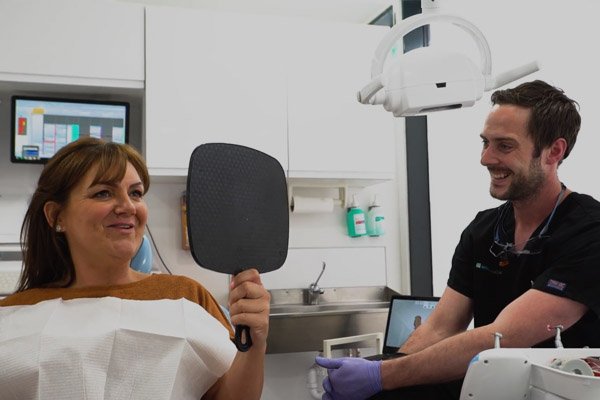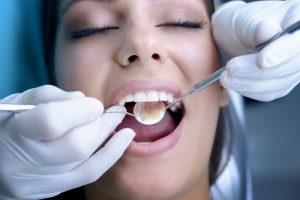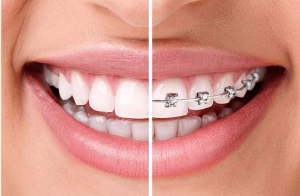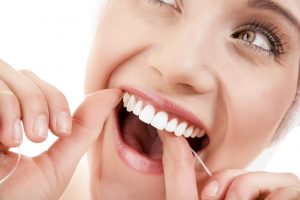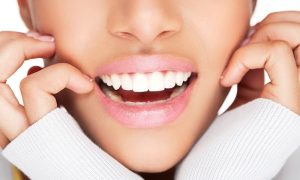Author Archive
Wisdom Tooth Pain: Are Your Wisdom Teeth Causing You Bother?
Wednesday, January 18th, 2017
Unfortunately, for many teens and adults across the UK, wisdom teeth can cause a lot of pain and discomfort to every day life.
If you’re one the unlucky souls experiencing wisdom tooth pain, you should make an appointment with your dentist to get the issue solved quickly and effectively.
Upon booking an consultation with the Brite Dental team for any wisdom tooth pain you are experiencing, your appointed dentist will check the condition of your wisdom teeth and advise you on the best course of action to get the problem solved.
In most cases, a quick X-ray of your mouth will give a clear idea of which wisdom teeth need to be removed and which teeth can be attended to with more everyday remedies, like antibacterial mouthwashes and advanced teeth and gum cleaning.
To find out more about wisdom tooth extraction and the common issues that wisdom teeth can cause, please read the helpful information laid out below.
Wisdom Tooth Infection: Common Wisdom Teeth Complaints
Wisdom teeth don’t always cause problems, as sometimes there will be enough space for them to come through in a convenient position.
However, for many, wisdom teeth can cause a lot of discomfort and they can cause severe dental problems further down the line. If a wisdom tooth is impacted and hasn’t fully broken through the gum, more serious complaints can fester. These include
-
Tooth decay
-
Gum disease
-
Pericoronitis (wisdom tooth infection)
-
Severe gum pain
In more extreme cases, a problematic wisdom tooth can trigger bacterial infections of the tongue, throat or cheek, while abscesses can form due to infection. In the rare case that a wisdom tooth hasn’t properly broken through the gum, cysts can form.
Avoid these painful risks by going for a regular dental check ups or contacting your dentist if any pain or swelling becomes apparent.
How Can I Reduce The Discomfort Of Wisdom Teeth?
If you experiencing wisdom tooth pain, there are a few at-home steps you can take to minmise the discomfort.
Rinsing your mouth with warm water and a teaspoonful of salt will help ease gum soreness and inflammation. Rinsing with salt water several times a day will help target areas you cannot reach with your toothbrush.
To relieve pain you can also take paracetamol or ibuprofen if you feel this is necessary.
However, if the pain is on-going and only getting worse, it is highly recommended that you speak to your dentist and have the issue of wisdom tooth pain dealt with by a professional. One common treatment for alleviating wisdom tooth pain is wisdom tooth extraction.
Wisdom Tooth Extraction: What is it & How Does it Work?
Wisdom tooth extraction is a very common procedure that does not pose any significant health or safety risks. It is the process of removing the wisdom tooth (or teeth) that are causing you pain, freeing up space in your mouth for all of your teeth to sit comfortably and in-line with one another.
In most instances of wisdom tooth extraction, your dentist will apply a local anaesthetic before moving on to the procedure itself.
If you’re having multiple or all your wisdom teeth removed, your dentist may use a stronger anaesthetic to ensure as little discomfort as possible during the procedure. For more anxious and nervous patients a sedative can be used to relax you.
Often, a small cut needs to be made into the gum tissue itself, freeing up the problem wisdom teeth for extraction. Particularly troublesome teeth may need to be broken up in to smaller pieces to ensure a total extraction.
Rest assured that your Brite Dental dentist will handle this procedure with as much care as possible and the long-term relieve will far outweigh any short term pain or fear.
Why It Is Important To Get Your Wisdom Teeth Removed?
Although many patients are reluctant to turn to their dentist for wisdom tooth extraction, the procedure is essential for ensuring optimum dental health.
When trapped or impacted teeth are removed, you’ll be able to chew more easily and alleviate yourself of the swelling and discomfort caused by erupting teeth.
What’s more, when wisdom teeth are left unchecked, they can damage the teeth immediately around them. These changes to your molars can become more noticeable over time and can lead to even more costly cosmetic procedures down the line.
If you’re suffering from on-going wisdom tooth pain, get in touch with the Brite Dental team today to discuss your options and book an appointment with our first-class clinical team.
Essential Dental Hygiene Tips For The Festive Period
Monday, December 12th, 2016
Even for those that maintain the most meticulous of dental hygiene routines, Christmas and the festive period can be a real challenge. You might be more concerned about what all those mince pies, turkey sandwiches and sugary sweets will be doing to your waistline, but one of your key concerns when it comes to your festive diet is in the impact it can have on your teeth. As you kick back and relax, your usual oral hygiene routine can fall behind schedule too, making those festive feasts all the more of a risk to a healthy smile.
The high-risk period between Christmas Eve and Boxing Day can really take its toll on your teeth and can leave lasting damage, from encouraging cavity formation, to contributing to tooth decay. Worse still, the height of the party season is one of the trickiest of times to track down a dentist should something more serious occur and you need emergency treatment pronto. To help safeguard your teeth against immediate and long-term dental problems, the Brite Team have put together an essential checklist for the Christmas break.
1. Don’t Fall Behind On The Basics
Any break from the usual routine can be an excuse to slack, but you should never cut corners when it comes to dental hygiene. Throughout the Christmas period, people tend to indulge. Although many expect to pile on a few pounds due to festive feasting, most overlook what that constant exposure to sugary and acidic foods is doing to their teeth. If you brush regularly after eating, bear in mind that you’ll need to work around mealtimes that are different from the usual. It’s also worth remembering that many of us celebrate the big day itself away from our own homes. If you’re heading to friends or family for your Christmas Day dinner, make sure you’re packing your toothbrush to fit in an essential bit of brushing maintenance after you’ve eaten your own body weight in turkey, sprouts and stuffing.
2. Watch Out For Sugary Foods
Our sugar intake shoots right up during the festive period due to all those sweet sauces, desserts and puddings. Even if you go easy on the pudding, the traditional main course itself is loaded up with things like cranberry sauce and other sugary condiments. Even the most harmless looking of ingredients can be seriously bad for your teeth. Don’t overlook how much sugar is packed into that dried fruit in your Christmas pudding, and keep an eye on the amount of sweetened soft drinks and alcoholic beverages you’re consuming.
3. Mix Up Your Meal Plan
Sometimes, the draw of a delicious trifle, pudding or mince pie is too much to resist. It’s fine to treat yourself during your Christmas break, but if you’re looking to cut out a few risk factors to your teeth, consider swapping out some of the sugar for other delicious alternatives. The humble cheese board is a stalwart of Christmas dinner tables and it’s a great go-to if you’re looking to indulge a little, without the worry of what you’re doing to your teeth.
Just a few little changes will ensure that your teeth emerge from December and into January with as clean a bill of health as possible. If you wish to discuss arranging a consultation with one of our dentists, or require more information about available dental treatments and plans, you can drop us a message via our online enquiry form. Prefer to speak to someone in person? Find the phone number of your nearest Brite Dental branch on our Contact page.
Straight Teeth Solutions At Brite Dental
Thursday, November 24th, 2016
Unlike what many people think, straightening teeth is not just about having a great, pearly white smile but also about ensuring your overall health and well-being. With the advancement in orthodontic treatment, technology and expertise as provided by Brite Dental you now have the option to enjoy straight teeth within a very short duration like 6 months or at an affordable cost but over a longer period.
Why Should You Straighten Your Teeth?
If you’ve got gaps in your teeth, an overbite, underbite, crooked teeth, deep bite, crowded teeth or any other type of misaligned teeth, you may want to consider straightening your teeth. Crowded teeth can cause difficulty in brushing and flossing your teeth, leading to plaque build-up, which can eventually result in tooth decay. Also, a wide gap between your teeth can cause red and swollen gums that can lead to periodontal disease. Straightening your teeth ensures that your gum fits nicely around your teeth, creating a good defence against any type of periodontal disease.
Benefits Of Straight Teeth
Having straighter teeth comes with many advantages. When teeth are well aligned, it helps the gums fit more securely around the teeth, allowing a stronger defence thus, lessening the risks of acquiring various serious diseases or health issues. One of the major benefits associated with orthodontic treatment is the overall improvement in your appearance. A straighter smile can give you a more youthful appearance and help you gain self-confidence. Chewing your food and cleaning your teeth will also become easier.
Various Teeth Straightening Solutions
Metal braces, which mainly comprise of wire and brackets is the traditional teeth straightening solution. More advanced options are Six Month Smiles, Inman Aligners and Invisalign Clear braces.
Choosing The Best Teeth Straightening Solution
To choose the best solution for you, some of the key things to consider are pricing, visibility and duration of dental treatment. Metal braces are generally the cheaper option but it will be clear to all that you’re wearing braces since they are made of stainless steel and other metal components.
For a more discrete option, you can opt for braces that have brackets the colour of your teeth.
If it is just your front teeth that need to be aligned and you would like this done quickly then our Inman Aligner may be for you. This is a simple removable appliance that can fix your teeth straightening issue in a matter of weeks.
However, if you are looking for a non- invasive approach to transform your smile, then Invisalign could be your solution. Invisalign refers to a clear kind of brace that is easily removable for eating, flossing, drinking and brushing your teeth purposes. It is the best option if you desire complete invisibility of your braces and a truly short dental treatment that ranges from 6 to 12 months. Also, you enjoy comfort – there are no wires, no brackets and other fixed components to make you feel conscious of wearing braces or uncomfortable while talking.
Get In Touch Today!
To help you choose the best option based on your budget, needs and desires, speak to our professional care team at Brite Dental. We will listen to your needs and concerns to find out the best option for you. Simply give your local Brite practice a call or contact us via our online form.
How To Avoid Cavities
Wednesday, November 2nd, 2016
Cavities are the most common problems dentists see. Left untreated they lead to tooth decay, gum disease or even health problems. At Brite Dental, we care that you have healthy teeth and a healthy smile so we’ve put together a few tips about cavities and how to avoid or treat them.
What Is A Tooth Cavity?
Tooth cavities simply mean holes in teeth. Our mouths are full of harmless bacteria but sometimes these attach themselves to the hard enamel surfaces of teeth and multiply rapidly. Once mixed with proteins in saliva, bacteria become the whitish plaque that we see around our teeth. If this isn’t removed the acid in it causes tooth decay, tooth cavities and gum disease as it dissolves your tooth enamel. Once tooth cavities have allowed bacteria access to the dentin inside your tooth, pain sets in and you will need a tooth filling to prevent further tooth decay or gum disease.
How Can I Avoid Tooth Cavities And Gum Disease?
Gentle, but thorough brushing of your teeth and gums twice a day is your first line of defence against developing a tooth cavity or gum disease. Use gentle back and forth movements, remembering to brush your tongue as well. Daily flossing adds an extra level of defence against developing a cavity, letting you remove food particles your toothbrush couldn’t reach. Finish your dental routine with an antibacterial mouthwash. Designed to fight bacteria they also leave you with fresh smelling breath. Limiting your intake of sweet food and drink is also very important as sugars react with the bacteria in plaque producing the harmful acids that lead to tooth cavities. If you do indulge in a treat remember to brush afterwards. Finally, regular check-ups at Brite dental enable our team to deal with small problems before you need a tooth filling or suffer more serious damage to your teeth and gums.
How Does The Brite Group Treat Cavities?
There are four main stages to cavity treatment with the aim of dealing with it before further tooth decay and gum disease sets in. When a cavity first appears we offer advice on diet and a fluoride covering may be applied to the area. A tooth filling may be needed to remove the decay and the cavity left behind filled with a safe substance. Don’t worry, a tooth filling is always carried out under local anaesthetic. If your tooth cavities have spread into the pulp or centre of the tooth then this may need to be removed. This root canal treatment prevents further tooth decay and the risk of gum disease. If the damage is too severe for a tooth filling, then teeth may need to be removed. Our Brite team will advise on this and how missing teeth can be replaced with partial dentures, bridges or implants.
Remember regular check-ups at Brite Dental will ensure we get to problems before the pain starts, a tooth filling is needed or gum disease sets in. So what are you waiting for? Contact your local Brite Dental today and we can help you look after your smile.
Brite Futures – Action for Children
Friday, July 15th, 2016
Action for Children charity – has been supporting the UK’s most vulnerable and neglected children for over 145 years. This charity helps children and young people by providing successful fundraising events, running children’s centres and helping young people into education, training and employment. This is only a fraction of the fantastic work they do.
Annually they host a Woman of Influence award ceremony and this year this was held at Glasgow’s Grand Central Hotel where over 300 guests attended. The Brite Dental team were fortunate enough to be part of this year’s illustrious event, where influential women in Scotland are recognised for their outstanding contribution to our society.
Over £62,000 was raised at this year’s event with Brite Dental being one of the headline sponsors. Moreover, Brite Dental donated money  for a trip to take 100 children and 53 parents from Clackmannanshire family centre to Auchingarrich. The trip is a great experience for the children to share with their family and for many, it will be their summer holiday. The outing will include a fun-filled day at Auchingarrich Wildlife Centre where there are a number of activities to keep the children amused and entertained. These include mini golf, indoor and outdoor play parks, tractors circuit and animal feeding. This gives these inner- city children a chance to experience life in the countryside and learn more about animals.
for a trip to take 100 children and 53 parents from Clackmannanshire family centre to Auchingarrich. The trip is a great experience for the children to share with their family and for many, it will be their summer holiday. The outing will include a fun-filled day at Auchingarrich Wildlife Centre where there are a number of activities to keep the children amused and entertained. These include mini golf, indoor and outdoor play parks, tractors circuit and animal feeding. This gives these inner- city children a chance to experience life in the countryside and learn more about animals.
Team members from each of our practices will benefit from this experience as they will also be attending. Brite Dental would like to thank everyone for their support and involvement in making this possible for this honourable cause. The generosity of this donation will give the children the opportunity to create fond memories they will cherish forever.
Your Checklist For A Healthy Smile
Monday, June 13th, 2016
To help maintain a healthy mouth, Brite Dental have made a daily checklist with some handy tips.
1. Brush Your Teeth Twice A Day For 2 Minutes
Brushing your teeth twice a day, in the morning and before you go to bed, is absolutely vital for keeping them healthy. Not only does brushing eliminate food particles and plaque from the mouth, but it prevents gum disease, tooth decay and bad breath. The recommended time of 2 minutes helps ensure that you are not rushing through the process and that all the teeth are clean. Always use gentle back and forth motion across your teeth and gum line when brushing.
2. Brush At Least 30 Minutes After Eating
After consuming acidic or sugary foods you should wait at least 30 minutes before brushing your teeth as this allows enough time for your saliva to neutralise the food acids. Theses acids are found in most foods and can be harmful to your tooth enamel as the acid contained in the food temporarily softens the enamel as these foods interact with the plaque in the mouth. Brushing directly after the consumption of such foods will cause further damage to the teeth surface. Don’t neglect your tongue! brushing your tongue helps remove plaque and bacteria that sticks to the surface which in turn can help fight bad breath.
3. Floss Once A Day
Many people forget this one! Flossing your teeth makes all the difference, it helps get rid of food particles that get stuck between your teeth that you cannot reach when brushing. It plays an important role in helping maintain good oral hygiene and preventing gum disease. Care must be taken when flossing to avoid irritating your gums which can often result in bleeding. Just ask at your local Brite, we would be more than happy to demonstrate how you can floss effectively.
4. Rinse With Antibacterial Mouthwash
Rinsing your mouth with antibacterial mouthwash after brushing is strongly recommended. Not only does it help remove plague and refresh your breath but can also help prevent tooth decay and gum disease.
5. Chew Sugarless Gum
Brushing your teeth after every meal is not very practical, plus over brushing can damage your enamel. So we advise chewing sugarless gum after eating. This will help to keep your breath smelling fresh but chewing also encourages the production of saliva which acts as a natural defence against acid. This also washes away food particles, helping to keep your teeth clean.
6. Limit Your Intake Of Sugary Foods And Beverages
We all enjoy indulging in sugary snacks every now and again, however consuming these too often can affect the whiteness of your smile and the freshness of your breath. What’s more of a concern is a poor diet can also lead to tooth decay and gum disease. This is due to the sugar reacting to bacteria in the plaque (the sticky layer on your teeth) and producing harmful acids. These acids then attack the teeth and destroy the enamel which can result in a cavity or hole forming.
Schedule Your Next Dental Appointment At Brite Dental
Incorporating these things into your daily routine will help you maintain a healthy smile. You should also remember to replace your toothbrush regularly. This should be done every 3 to 4 months or when the bristles start to look worn. Don’t forget to visit your dentist regularly; frequent check-ups are essential, so why not contact us and book your next appointment at Brite Dental?
Teeth Whitening At Brite Dental
Friday, May 27th, 2016
What Causes The Discolouring Of My Teeth?
Unfortunately, teeth can become stained and discoloured due to a variety of reasons. Sometimes your teeth will become discoloured simply due to ageing. However, lifestyle and food choices can also take their toll on your pearly whites. Luckily you don’t need to put up with stained teeth and a highly effective, affordable and pain-free solution is to visit your local Brite practice to have your teeth professionally whitened. From whitening strips to whitening toothpaste there’s a wide range of ways to get your teeth brighter. Here’s how to choose a safe method that is effective and won’t harm your teeth.
What Is Teeth Whitening?
Teeth whitening is a dental treatment that lightens your teeth and helps to remove stains and discolouration. It is one of the most popular dental cosmetic procedures because your teeth can have such a huge impact on your overall appearance. It is the process of restoring the natural tooth colour shade or making the teeth whiter than the natural colour shade.
What Happens During The Teeth Whitening Process?
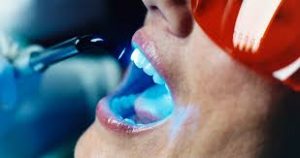 To give your smile a quick, effective mini-makeover pop into your local Brite where our dental clinician performs in-house whitening on you by placing a protective barrier between your teeth and your gums. The teeth whitening gel is then applied to your teeth and the gel is stimulated with a blue light that is on the teeth for ten minutes. The gel is then washed off and this step is repeated twice. This safe in house procedure allows our dentists to whiten your teeth within the hour, meaning you can leave your local Brite with a glistening smile. To help maintain this or if you would simply prefer to whiten your teeth in your own home. Our dental team can offer you safe and effective teeth whitening kits which include bespoke whitening trays and professional teeth whitening gels.
To give your smile a quick, effective mini-makeover pop into your local Brite where our dental clinician performs in-house whitening on you by placing a protective barrier between your teeth and your gums. The teeth whitening gel is then applied to your teeth and the gel is stimulated with a blue light that is on the teeth for ten minutes. The gel is then washed off and this step is repeated twice. This safe in house procedure allows our dentists to whiten your teeth within the hour, meaning you can leave your local Brite with a glistening smile. To help maintain this or if you would simply prefer to whiten your teeth in your own home. Our dental team can offer you safe and effective teeth whitening kits which include bespoke whitening trays and professional teeth whitening gels.
What Results Should I Expect?
With Brite Dental’s whitening treatment, you can achieve a smile up to 10 shades lighter! Whether you choose to undergo treatment in the comfort of your local Brite dental practice or use our teeth whitening kits in the convenience of your own home, teeth whitening is a quick and convenient way to gain a better-looking smile. There is no need for you to smile with a closed mouth any more because your brighter and healthier smile will give you a shot of self- confidence. Improving your self-esteem, appearance and positively affecting other people’s perceptions of you are only a few of the benefits that you will experience from teeth whitening.
The first thing many people notice about us is our smile and with our current teeth whitening plan, this is the perfect time to spoil yourself with a brightness boost. For more information about our fantastic offer contact us today!
Childsmile Scheme Saves Scotland £5M A Year
Tuesday, July 7th, 2015
 Recent data has shown that the Scottish Childsmile programme saves nearly £5 million a year in treatments costs. The statement was made by Scotland’s public health minister Maureen Watt. She explained that the savings have been made due to a decrease in the amount of fillings, general anaesthetics and extractions required.
Recent data has shown that the Scottish Childsmile programme saves nearly £5 million a year in treatments costs. The statement was made by Scotland’s public health minister Maureen Watt. She explained that the savings have been made due to a decrease in the amount of fillings, general anaesthetics and extractions required.
What Is The Childsmile Scheme?
Childsmile is a national programme that was created in Scotland to improve the oral health of children and improve access to dental services. The scheme was created in 2008 and works in partnership with various schools, nurseries and dental practices.
How Has Childsmile Helped Improve Children’s Dental Health In Scotland?
The Childmsile programme has not only helped save millions of pounds but it has also helped improve the dental health of children in Scotland. Since the scheme was introduced, Scotland has seen a decrease in the number of primary one children with ‘obvious decay experience’ from 46% to 32%. 92% of Scottish children are also now registered to a NHS dentist. The results of the scheme have shown what a focus on prevention and education can achieve.
NHS Childsmile Programme and Brite Dental
Brite Dental is happy to be a part of Scotland’s Childsmile programme. As part of the Childsmile scheme, children receive free toothbrushes, toothpaste and two fluoride varnish applications per year. Children attending nursery and those who attend a primary school in a deprived area are also offered daily supervised brushing. A key focus of the programme is to prevent the development of dental decay which is important to avoid the need for root canal treatment. Brite Dental are proud to help children learn about their dental health and ways to improve it.
Brite Dental is an NHS and cosmetic dentistry dental practice. To find out more, or to register, contact us today.
Are You Considering Dental Veneers?
Tuesday, June 30th, 2015
 There are many ways that your teeth can become damaged over time, from chipping and wearing to staining and overall ageing. Few of us are born with a perfect Hollywood smile, and many people find that their imperfect teeth can lead to a general lack of confidence in their appearance and a reluctance to smile. If you are one of these people, then it may be time to consider dental veneers.
There are many ways that your teeth can become damaged over time, from chipping and wearing to staining and overall ageing. Few of us are born with a perfect Hollywood smile, and many people find that their imperfect teeth can lead to a general lack of confidence in their appearance and a reluctance to smile. If you are one of these people, then it may be time to consider dental veneers.
What Are Dental Veneers?
Veneers are the dental equivalent of false fingernails, using an overlay to cover up dental damage, staining, and general signs of wear. It is an effective method of teeth whitening for severely stained teeth without resorting to harsh chemical treatments, and it can also be used for teeth straightening in cases where your teeth are not too crooked and orthodontic braces are not an option.
How Do Veneers Work?
Veneers are made out of porcelain, ceramic or a composite substance, shaped and coloured to match your existing healthy teeth, and cut into slivers as thin as an egg shell. These slivers are then permanently bonded to your teeth to undetectably cover up the unsightly damage or staining. Veneers can be used on a single tooth to quickly repair any localised damage, or on your whole smile to improve overall appearance and remedy excessive discolouration. They can also be used to fill in gaps by reshaping and enlarging your existing teeth, and also to fix mild cases of crookedness where conventional orthodontic treatment could take up to a year or more.
Dental veneers are resistant to staining from tea, coffee or even cigarette smoking meaning you can have a straight, white smile for many years.
What’s Involved in Veneer Treatment?
The dental veneer procedure is a fairly complicated one and will require two visits to the clinic. You should be wary of dentists who are willing to perform the treatment quickly in one appointment. In the first appointment, your teeth are given a detailed check up to look for any underlying signs of trouble that might negatively impact the success of the veneers, and then a detailed mould of your teeth is made from which the final veneers will be fashioned. While your veneers are being made, which will take approximately a fortnight, you will be fitted with a temporary set which will give a good indication of the final results. Once the finished veneers have been received back from the ceramist, they can be permanently bonded to your teeth leaving you with the attractive smile you’ve been looking for.
Cosmetic Dentistry at Brite Dental
Dental veneers are one of many cosmetic dentistry treatments. If you are unhappy with your smile, you should discuss with your dentist the various options available to find the one that is right for you. Brite Dental offer their patients a wide range of cosmetic dentistry treatments including Six Month Smiles and teeth whitening.
To find out more about how we can help you achieve your perfect smile, contact us today to make an appointment.
What To Do in a Dental Emergency
Monday, June 22nd, 2015

Tooth enamel is the strongest substance in the human body, however, it is not completely invincible. Through bad oral hygiene, accidental damage or hard foods, tooth enamel can become chipped, cracked, or in worse case scenarios, the tooth can be completely knocked out.
Enamel has no living cells so the body is unable to repair chipped or cracked teeth itself. This is why it is important that if you or someone in your family experiences a dental emergency you follow the right precautions in order to cause the least amount of damage and stress.
In this short blog on dental emergencies, we’ll answer the question of “what is a dental emergency” as well as listing some of the most common dental emergencies you may experience and how you should cope with them if they ever arise.
What is a Dental Emergency?
A dental emergency involves severe dental trauma or pain. Common examples of a dental emergency are:
- A tooth being knocked out or dislodged
- A tooth being cracked or chipped
- Excessive bleeding in the gums and mouth
- Severe toothache
- Abscesses or swellings which cause severe pain and discomfort
Please remember that it’s critical for a dental emergency to be addressed as soon as possible in order to prevent long-term damage and more severe trauma from developing.
For patients experiencing a dental emergency, you can contact one of our surgeries directly or phone NHS 111 if the emergency happens out of hours.
Severe Toothache
Toothache is the pain you can experience in and around your jaw and teeth. Toothache can feel different and ranges from constant dull pain to shooting, more intense pain. It can also be caused by a number of different reasons, including sensitivity, tooth decay and gum disease.
If your toothache has lasted more than one or two days then you should make an emergency appointment to visit your dentist to have it checked and to find out its cause.
If your toothache is caused by dental decay and you leave it untreated then your tooth will become infected, leading to severe pain and in some cases, you will require root canal treatment to save the tooth from extraction.
To aid your toothache whilst you wait to see the dentist you can take painkillers, such as ibuprofen and paracetamol. You can also hold a cold compress to the outside of your cheek. You should not hold anything cold directly on your tooth as this can make the pain worse.
Chipped or Broken Tooth
If you have chipped a part of your tooth and have managed to recover it, you should store the fragment in a clean container filled with your saliva or milk until you are able to visit a dentist.
Your dentist may be able to reattach the fragment back onto your tooth. You should also make sure to rinse your mouth out with warm water and apply pressure with a piece of gauze to the area if your mouth is bleeding.
If your dentist is unable to reattach your own tooth, they will replace it with a filling or crown depending on which tooth it is that is chipped. If the chip has occurred and broken half way down your tooth then you may have damaged the nerves. These instances can become very serious as damaged pulp can become infected.
Knocked Out or Dislodged Tooth
If your tooth has been completely knocked out it is very important that you treat it with care – only handling it by the crown (white part at the top) and avoid touching the tooth’s root. If the tooth is dirty, you should avoid brushing or scraping it and instead rinse it with milk or saline (salt water) – not water or alcohol.
You should attempt to put the tooth back in the socket as soon as possible and once it is in place bite down on a clean piece of fabric such as a handkerchief to keep it in place.
If you are unable to place the tooth back in its socket you should keep it in a clean container filled with either your own saliva or milk until you are able to visit a dentist. Like a chipped tooth, you should also make sure to rinse your mouth out with warm water and apply pressure with a piece of gauze to the area if your mouth is bleeding.
This advice is only for adult teeth. If your child’s baby tooth falls out, you should not try and reinsert it as their adult teeth will grow in as a replacement.

